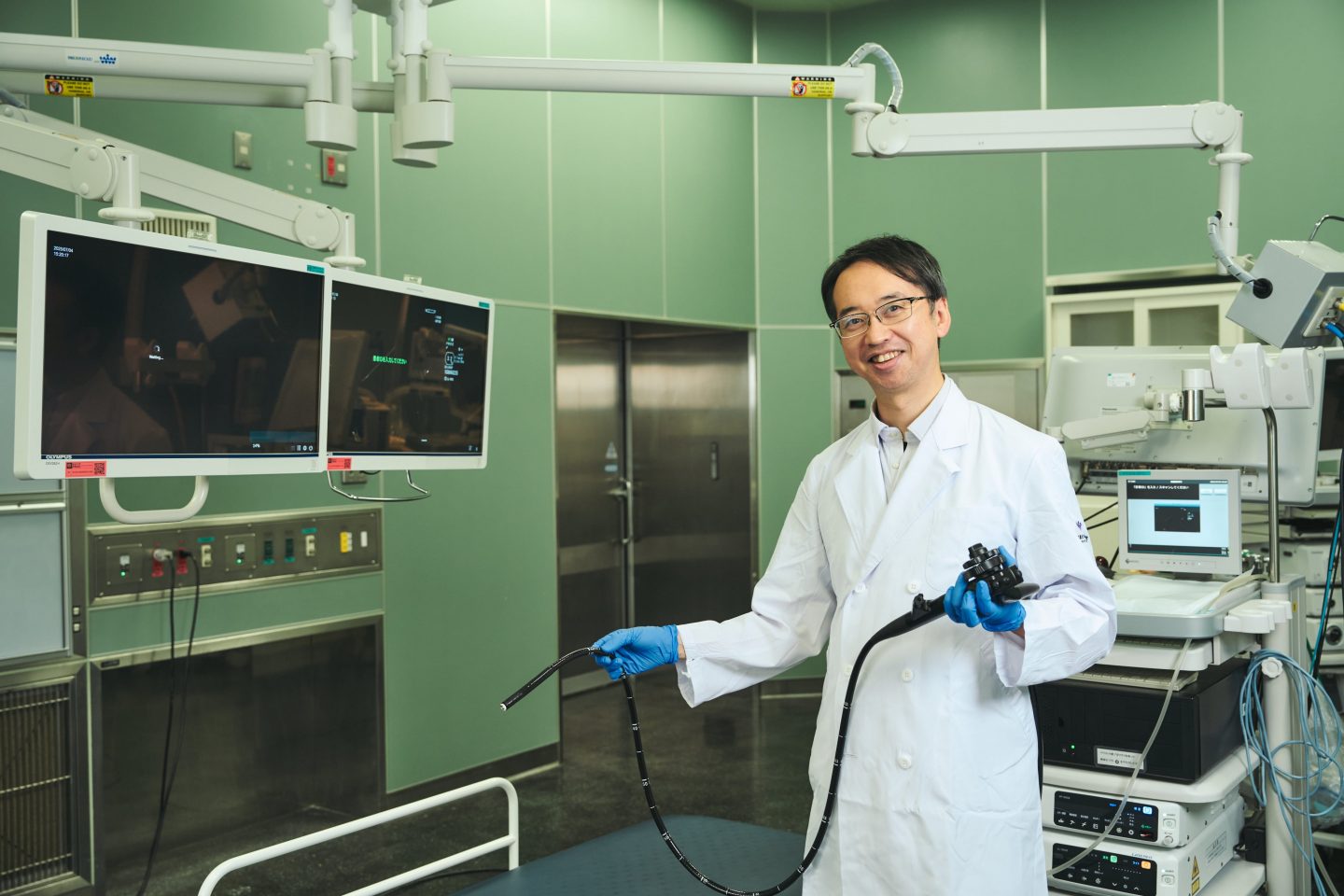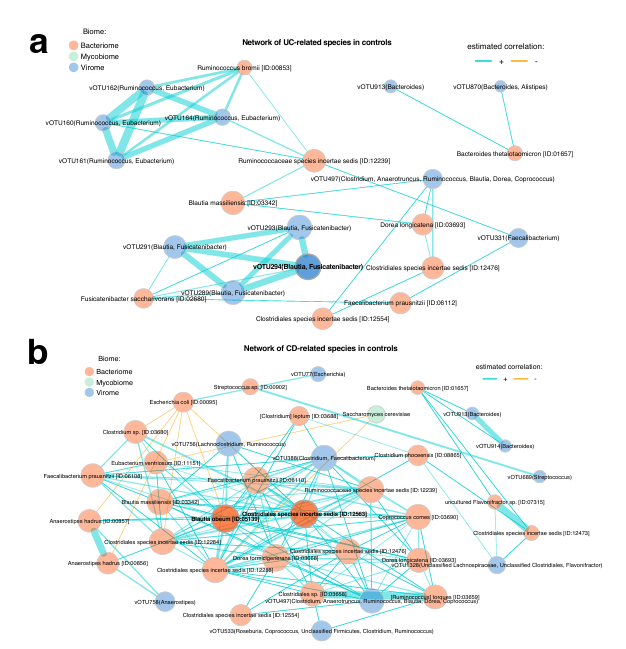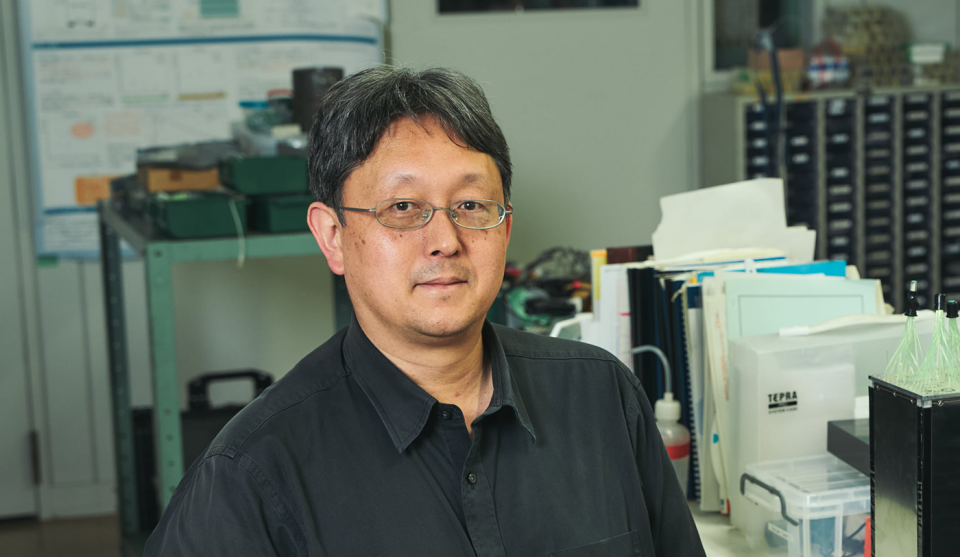Inflammatory bowel disease (IBD) is a designated intractable disease for which a definitive cure has not yet been established, and the number of patients has recently been increasing worldwide. Although new therapeutic drugs are being developed, the high recurrence rate after the discontinuation of medication means that patients must often rely on lifelong treatment, resulting in significant personal burden and rising healthcare costs. In response to this, Dr Akiyama and colleagues aim to clarify “what is necessary to maintain a healthy intestinal environment” with the goal of developing methods that prevent recurrence after the discontinuation of medication and ultimately realizing strategies that contribute to the prevention of IBD onset itself.

Aiming for a recurrence-free state even after discontinuing medication
IBD is a collective term for disorders characterized by chronic inflammation of the intestinal mucosa. It is classified into two main types: ulcerative colitis (*1) and Crohn’s disease. These disorders are designated as “intractable diseases” (*2) by the Japanese government. The exact causes and mechanisms of onset remain unknown, and a definitive cure has yet to be established.
While a complete cure is currently difficult, the steady development of anti-inflammatory therapies for the intestinal tract has enabled many patients to live lives comparable to those of healthy individuals. However, relapse is common after the discontinuation of medication, and most patients must rely on lifelong pharmacological treatment. The number of IBD patients has been rapidly increasing in Asian countries in recent years, with Japan now ranking second only to the United States in the total number of cases.
Based on my clinical experience in both Japan and the United States, I have strongly felt the need to find a fundamental solution to the current situation in which the number of IBD patients continues to increase, despite the absence of a definitive cure.
The current goal of IBD treatment is to achieve “mucosal healing,” a state in which inflammation of the intestinal mucosa is no longer present. However, even when mucosal healing is achieved, many patients experience relapse after discontinuing medication. In response to this challenge, we are conducting quantitative and objective analyses to elucidate the relationship between changes in the intestinal environment and chronic inflammation in IBD patients, with the goal of identifying intestinal conditions that do not lead to recurrence even after the cessation of medication. Our ultimate aims are to achieve a state of “IBD drug-free” intestinal health, namely, maintaining a healthy gut without dependence on therapeutic drugs, and to discover preventive strategies that reduce the risk of both relapse and disease onset.
(*1) Ulcerative colitis affected former Prime Minister Shinzo Abe. While he was able to manage his symptoms and lead a long second term in office through the use of therapeutic drugs, another relapse was suspected to have ultimately led to his resignation.
(*2) Designated intractable diseases are those specified by the Minister of Health, Labour and Welfare of Japan. These are diseases for which a definitive cure has not yet been established, which affect a limited number of patients, and for which objective diagnostic criteria exist. Patients with these conditions are eligible for financial assistance with medical expenses.
Comprehensive analysis of the gut microbiome
IBD is considered to develop through a complex interplay of multiple factors. As specialists in gastroenterology, we are collaborating not only with gastroenterologists but also with researchers in microbiology and mechanical engineering to investigate the causes and mechanisms of IBD onset through a multidisciplinary approach. One such effort focuses on the gut microbiome, a community of microorganisms including bacteria, fungi, and viruses residing in the intestines.
In 2024, we joined a project centered on the large-scale microbiome database known as the Japanese 4D Cohort, led by Associate Professor Naoyoshi Nagata of Tokyo Medical University. Using a shotgun metagenomic analysis, a method that comprehensively analyzes DNA extracted from environmental or biological samples to identify microbial species and functional genes, we identified characteristic gut microbial profiles and their interaction networks that are consistently observed in patients with IBD (Figure). These microbial signatures were not unique to Japanese patients, with several findings reproduced in multiple non-Japanese IBD cohorts.
A more detailed understanding of how changes in the intestinal environment, including the microbiome, trigger chronic inflammation may lead to the development of novel preventive strategies to reduce the recurrence and onset of IBD.

Akiyama, S., Nishijima, S., Kojima, Y. et al. Multi-biome analysis identifies distinct gut microbial signatures and their crosstalk in ulcerative colitis and Crohn’s disease.
Nat Commun 15, 10291 (2024). https://doi.org/10.1038/s41467-024-54797-8.
Copyright 2024 Akiyama, S. et al., under the terms of the Creative Commons CC BY-NC-ND license(https://creativecommons.org/licenses/by-nc-nd/4.0/).
Figure. IBD-specific gut microbial networks
Panels a and b show correlation networks among bacteria (bacteriome), fungi (mycobiome), and phages (virome) that significantly differ in ulcerative colitis and Crohn’s disease, respectively. Orange nodes represent bacterial species, green nodes represent fungal species, and blue nodes represent phage species. Some of these characteristic patterns have also been observed in IBD patients from the United States, Spain, the Netherlands, and China.
Taking on an unexplored frontier to realize IBD prevention and reduce the number of patients
The development of therapeutic drugs for IBD is progressing rapidly worldwide. In contrast, research from a preventive perspective remains in the early stages, with only a limited number of groups actively conducting investigations in this largely uncharted field.
IBD develops through a complex interplay of multiple factors, making it a condition that cannot be prevented through a single, simple intervention. Addressing this challenge is far from easy. Nevertheless, I am firmly committed to undertaking this crucial task. With a long-term perspective over the next decade and beyond, I aim to establish effective preventive strategies and ultimately reduce the number of individuals affected by IBD.
(Date of interview: June 19, 2025)






